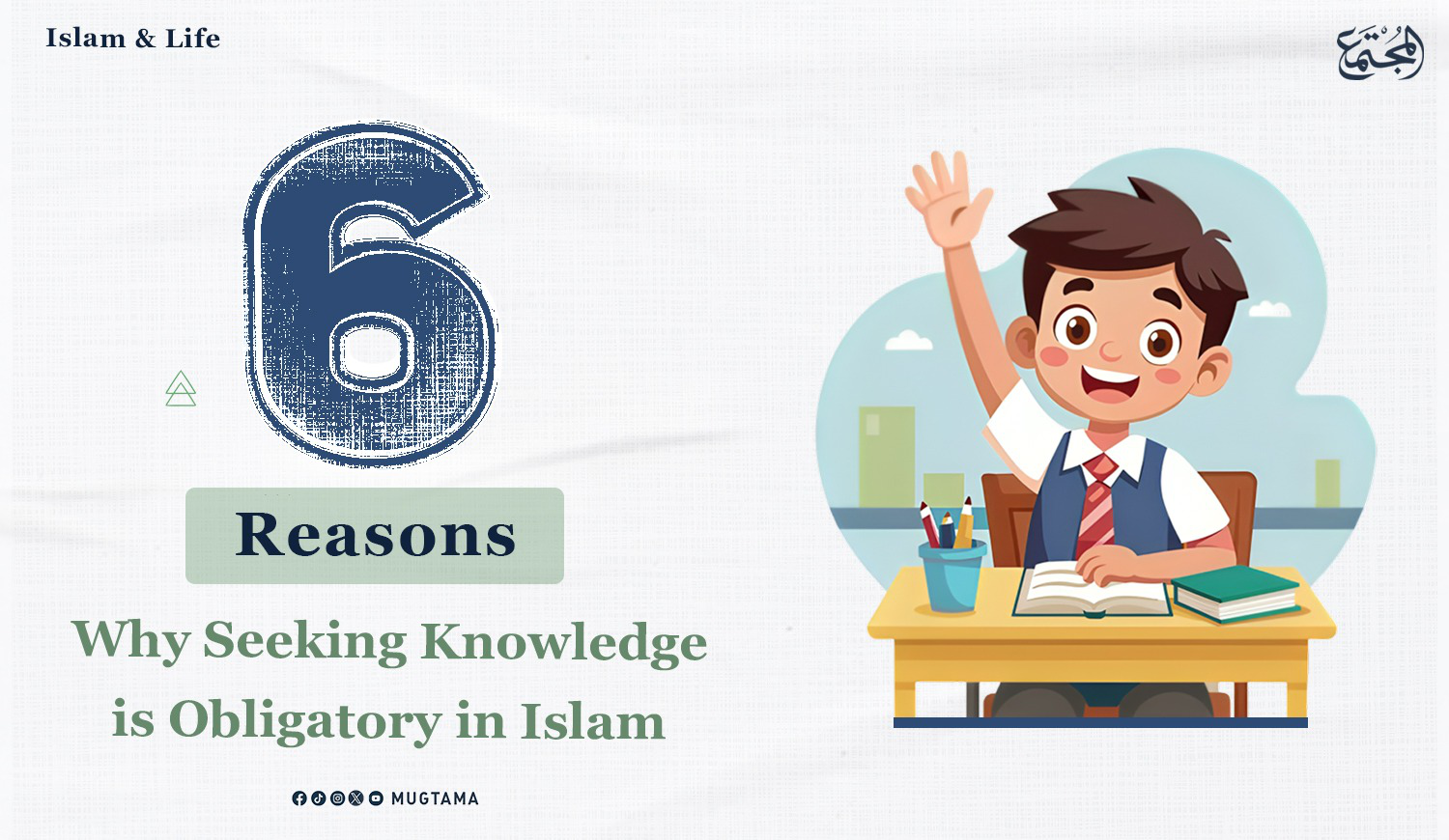6 Reasons Why Seeking Knowledge is Obligatory in Islam

The Prophet (peace be upon him)
affirmed that knowledge is an obligation upon everyone. In Sunan Ibn Majah,
Anas Ibn Malik narrated that the Messenger of Allah (peace be upon him) said: “The search for knowledge is an obligation laid on every
Muslim.”
The meaning of knowledge here is not limited to religious knowledge alone, but
includes both religious and worldly knowledge.
So, why did Islam make learning an obligation?
1.
Knowledge Leads to Faith and Fear of Allah
Allah Commanded His Prophet
(peace be upon him) in the Quran: {So, know ˹well, O Prophet,˺ that there is no god ˹worthy of worship˺ except Allah. And seek forgiveness for your shortcomings and
for ˹the sins of˺ the believing men and women.} [Muhammad
47:19]
This knowledge, which Allah Commanded, is the knowledge of His Oneness (Tawheed), and
it is a personal obligation upon every human being, never lifted from anyone,
no matter who they are. True faith cannot be complete without knowledge.
Knowledge is also the path to
fearing Allah, as He said: {Of all of Allah’s
servants, only the knowledgeable ˹of His might˺ are ˹truly˺ in awe of Him.} [Fatir 35:28]
Worship cannot be valid without
knowledge, for a Muslim cannot pray, fast, give zakah, or perform Hajj unless
he knows the rulings of these acts of worship. Ignorance in
performing obligations may lead to their corruption entirely. Likewise,
knowledge preserves the creed from deviation, protecting the Muslim from shirk,
innovations, and misguidance.
2.
Knowledge Elevates Ranks and Leads to Paradise
Islam made seeking knowledge an
obligation that brings reward and elevates a Muslim’s status. Allah Said: {Allah will elevate those of you who are faithful, and ˹raise˺ those gifted with knowledge in rank.} [Al-Mujadilah 58:11]
Through learning, a Muslim can
attain Paradise. In Musnad Ahmad, Abu Hurairah (may Allah be pleased
with him) narrated that the Messenger of Allah (peace be upon him) said: “Whoever takes a path upon which to obtain knowledge,
Allah makes the path to Paradise easy for him.”
In Sunan Abu Dawud and Ibn
Majah, Abud-Darda’ (may Allah be pleased with him) narrated that the Messenger
of Allah (peace be upon him) said: “The learned
are the heirs of the prophets who leave neither dinar nor dirham, leaving only
knowledge, and he who accepts it accepts an abundant portion.”
3.
Knowledge Brings Goodness
Knowledge opens the doors of
goodness. In Sahih Al-Bukhari and Muslim, Mu`awiyah Ibn Abi
Sufyan (may Allah be pleased with him) said: I heard the Messenger of Allah
(peace be upon him) say: “When God wishes good
for anyone He instructs him in the religion.”
Thus, religious knowledge is a means by which Allah opens goodness. Likewise, worldly
knowledge is also goodness, for all knowledge is good.
4.
Knowledge Ensures Sound Understanding
A person cannot use the tools of
life without knowledge of them, whether these tools are material—like
machinery—or abstract—like ideas, parables, and sciences. Therefore, Allah Emphasized
that parables are only understood by people of knowledge: {These are the parables We set forth for humanity, but
none will understand them except the people of knowledge.} [Al-`Ankabut 29:43]
5.
Knowledge Enables Succession and Civilizational Empowerment
Learning is not a luxury in life,
it is the very foundation of life. When Allah Placed Adam (peace
be upon him) on this earth, He taught him all the names: {He taught Adam the names of all things.} [Al-Baqarah
2:31]
Thus, the first step in human succession
was knowledge. Knowledge is the basis for fulfilling the mission of succession
on earth.
Strong civilizations cannot be built except upon knowledge. When
speaking of the civilization of Dawud and Sulayman (peace be upon them), Allah Said:
{Indeed, We granted knowledge to David and Solomon.
And they said ˹in acknowledgment˺, “All praise is for Allah Who has privileged us over many of His
faithful servants.” And
David was succeeded by Solomon, who said, “O people! We have been taught the
language of birds, and been given everything ˹we need˺. This
is indeed a great privilege.”} [An-Naml 27:15–16]
When Prophet Yusuf (peace be upon
him) sought to take responsibility for the treasures of the land to protect
them, he said to the Aziz of Egypt: {Joseph
proposed, “Put me in charge of the store-houses of the land, for I am truly
reliable and adept.”} [Yusuf 12:55]
Thus, knowledge is the essential
pillar of a nation’s progress. Throughout history, prosperous societies thrived
on knowledge and learning. In the Islamic civilization, Muslims
excelled in medicine, astronomy, mathematics, and more—because they understood
that knowledge is the key to power and advancement. Seeking knowledge is
therefore an obligation because it builds a strong and advanced society.
6.
Knowledge Provides Protection and Safeguarding
A nation may build its
civilization but fail to protect it if it lacks knowledge and strength.
Ignorance can destroy nations. As knowledge builds houses without pillars,
while ignorance destroys the houses of glory and honor.
Allah Taught Dawud (peace be upon
him) the craft of making armor to protect his civilization: {We taught him the art of making body armour to protect
you in battle. Will you then be grateful?} [Al-Anbya’ 21:80]
Thus, learning serves as
protection for the Ummah against dependency and weakness. A nation that loses
knowledge has no decision-making power and cannot preserve its identity.
For Further Reading:
- AI Role in the Rise of Digital Religiosity
- How Fiqh Education Reforms the Muslim Personality?
- Cheating in Exams… Destruction of Societies!
-------------------------------------------------------------











